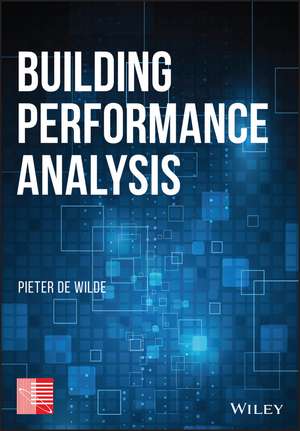Building Performance Analysis
Autor P de Wildeen Limba Engleză Hardback – 19 iul 2018
Explores and brings together the existent body of knowledge on building performance analysis
Building performance is an important yet surprisingly complex concept. This book presents a comprehensive and systematic overview of the subject. It provides a working definition of building performance, and an in-depth discussion of the role building performance plays throughout the building life cycle. The book also explores the perspectives of various stakeholders, the functions of buildings, performance requirements, performance quantification (both predicted and measured), criteria for success, and the challenges of using performance analysis in practice.
Building Performance Analysis starts by introducing the subject of building performance: its key terms, definitions, history, and challenges. It then develops a theoretical foundation for the subject, explores the complexity of performance assessment, and the way that performance analysis impacts on actual buildings. In doing so, it attempts to answer the following questions: What is building performance? How can building performance be measured and analyzed? How does the analysis of building performance guide the improvement of buildings? And what can the building domain learn from the way performance is handled in other disciplines?
- Assembles the current body of knowledge on building performance analysis in one unique resource
- Offers deep insights into the complexity of using building performance analysis throughout the entire building life cycle, including design, operation and management
- Contributes an emergent theory of building performance and its analysis
Building Performance Analysis will appeal to the building science community, both from industry and academia. It specifically targets advanced students in architectural engineering, building services design, building performance simulation and similar fields who hold an interest in ensuring that buildings meet the needs of their stakeholders.
Preț: 818.07 lei
Preț vechi: 898.97 lei
-9% Nou
156.54€ • 163.85$ • 130.29£
Carte tipărită la comandă
Livrare economică 31 martie-14 aprilie
Specificații
ISBN-10: 1119341922
Pagini: 616
Dimensiuni: 170 x 244 x 30 mm
Greutate: 1.32 kg
Editura: Wiley
Locul publicării:Chichester, United Kingdom
Public țintă
- The building science community, both from industry and academia, which needs a theory on building performance to connect the work in design with that in building simulation and measurement
- Students at MSc level with an interest in building performance. Specific targets are courses in building simulation, building engineering, and environmental building design
- PhD–students and researchers who are active in these areas
Textul de pe ultima copertă
Explores and brings together the existent body of knowledge on building performance analysis
Building performance is an important yet surprisingly complex concept. This book presents a comprehensive and systematic overview of the subject. It provides a working definition of building performance, and an in-depth discussion of the role building performance plays throughout the building life cycle. The book also explores the perspectives of various stakeholders, the functions of buildings, performance requirements, performance quantification (both predicted and measured), criteria for success, and the challenges of using performance analysis in practice.
Building Performance Analysis starts by introducing the subject of building performance: its key terms, definitions, history, and challenges. It then develops a theoretical foundation for the subject, explores the complexity of performance assessment, and the way that performance analysis impacts on actual buildings. In doing so, it attempts to answer the following questions: What is building performance? How can building performance be measured and analyzed? How does the analysis of building performance guide the improvement of buildings? And what can the building domain learn from the way performance is handled in other disciplines?
- Assembles the current body of knowledge on building performance analysis in one unique resource
- Offers deep insights into the complexity of using building performance analysis throughout the entire building life cycle, including design, operation and management
- Contributes an emergent theory of building performance and its analysis
Building Performance Analysis will appeal to the building science community, both from industry and academia. It specifically targets advanced students in architectural engineering, building services design, building performance simulation and similar fields who hold an interest in ensuring that buildings meet the needs of their stakeholders.
Descriere
Explores and brings together the existent body of knowledge on building performance analysis
Building performance is an important yet surprisingly complex concept. This book presents a comprehensive and systematic overview of the subject. It provides a working definition of building performance, and an in-depth discussion of the role building performance plays throughout the building life cycle. The book also explores the perspectives of various stakeholders, the functions of buildings, performance requirements, performance quantification (both predicted and measured), criteria for success, and the challenges of using performance analysis in practice.
Building Performance Analysis starts by introducing the subject of building performance: its key terms, definitions, history, and challenges. It then develops a theoretical foundation for the subject, explores the complexity of performance assessment, and the way that performance analysis impacts on actual buildings. In doing so, it attempts to answer the following questions: What is building performance? How can building performance be measured and analyzed? How does the analysis of building performance guide the improvement of buildings? And what can the building domain learn from the way performance is handled in other disciplines?
- Assembles the current body of knowledge on building performance analysis in one unique resource
- Offers deep insights into the complexity of using building performance analysis throughout the entire building life cycle, including design, operation and management
- Contributes an emergent theory of building performance and its analysis
Building Performance Analysis will appeal to the building science community, both from industry and academia. It specifically targets advanced students in architectural engineering, building services design, building performance simulation and similar fields who hold an interest in ensuring that buildings meet the needs of their stakeholders.
Cuprins
Notă biografică
PIETER DE WILDE is Professor of Building Performance Analysis at Plymouth University, UK. His research interests are the design, construction and operation of buildings that perform as expected by all stakeholders. Educated at TU Delft in the Netherlands, he has over 20 years of experience with research projects that involve both building performance simulation and building monitoring. He serves on the Board of the International Building Performance Simulation Association (IBPSA) and the European Group for Intelligent Computing in Engineering (EG-ICE). Professor de Wilde is Fellow of IBPSA and CIBSE, and member of ASHRAE.










